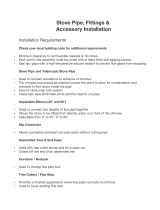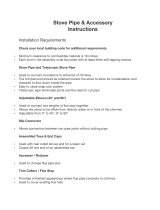
16
Dutchwest
30003847
How to Build and Maintain a Wood Fire
Loading Wood
Your Dutchwest Convection Heater accepts wood from
both the front and side. Front loading is useful for kin-
dling a new fire and adding an occasional log, however,
we recommend side loading as most convenient when
adding several logs at a time. Always be certain that
the stove damper is open before opening either door.
WARNING: OPERATE YOUR DUTCHWEST CON-
VECTION HEATER ONLY WITH THE DOORS FULLY
CLOSED EXCEPT WHEN REFUELING.
THIS STOVE IS HOT WHILE IN OPERATION! KEEP
CHILDREN, CLOTHING, AND FURNITURE AWAY.
CONTACT MAY CAUSE SKIN BURNS.
Break-in Fires
If your stove is new or has new cast iron replacement
parts, “season” the new cast iron with a few break-in
fires. Follow Steps 1-3 below. Then let the fire burn
out. Do not close the damper. Maintain a small, but not
smoky, fire by adjusting the primary air control. After
the break-in fires, continue with Step 4.
The stove’s paint and cement will emit a slight odor
as these materials cure during the first few fires. You
may wish to provide extra ventilation near the stove by
partially opening a door or window when the odor is
present.
Lighting the Fire
Step 1. Open the stove damper. Fully open the pri-
mary air control and close the secondary (catalyst) air
control.
Step 2. Lay some crumpled newspapers in the stove.
Place six or eight finger-width size pieces of dry kindling
on the paper. On the kindling, lay two or three larger
sticks of split dry wood approximately 5-51 mm (1-”)
thick.
DO NOT USE CHEMICALS OR FLUIDS TO START
THE FIRE. DO NOT BURN GARBAGE OR FLAM-
MABLE FLUIDS SUCH AS GASOLINE, NAPTHA, OR
ENGINE OIL.
Also, never use gasoline-type lantern fuel, kerosene,
charcoal lighter fluid, or similar liquids to start or “fresh-
en up” a fire in this heater. Keep all such liquids well
away from the heater while it is in use.
Step 3. Light the newspaper and close the door. The
fire should be well-established within 10-15 minutes.
You may gradually build it up by adding a few sticks at
a time of a progressively larger size. Continue to build
the fire until a live coal bed begins to form.
NOTE: An especially large, outdoor, or cold chimney
may need to be “primed,” or warmed up, before it will
draw sufficiently to start a fire. If this is the case, roll up
a couple pieces of newspaper, place them on top of the
kindling and toward the back of the stove, light them,
and close the doors. This should heat the chimney
enough to initiate a draft.
Once the draft is established, open the front door and
light the rest of the fuel from the bottom. Do not light
the main bed of fuel until the chimney begins drawing.
Repeat the procedure as often as necessary if the initial
attempt is unsuccessful.
Step 4. After a lively fire has been established, (ap-
prox. 30 minutes) close the stove damper.
Step 5. Close the primary air control to a medium low
setting. The fire volume will diminish immediately, but
the stove will continue to warm up. Maintain control of
the fire using the primary air control. Reduce the setting
for a smaller fire, increase the setting for a hotter, more
intense fire. Refer back to the air control settings chart
on Page 18.
Step 6. Open the catalyst air control. Refer back to the
air control settings chart on Page 18.
DO NOT OVERFIRE THIS HEATER. Overfiring may
cause a house fire, or can result in permanent damage
to the stove. If a part of the stove or the chimney con-
nector glows, you are overfiring.
Reloading and Reviving the Fire
Open the stove damper and wait at least thirty seconds
for the draft to increase. Open the door slowly and add
the fuel. Split firewood will fill the firebox more com-
pletely than will unsplit wood and will thereby reduce
the frequency of reloading.
You may find that the fire intensity will decrease after
reloading, particularly if the loading door is open a
long time. Stimulate the fire by increasing the primary
air supply and leave the stove damper open. Then as
soon as the fire is reestablished, close the damper and
reduce the air supply to prevent over-firing.






















